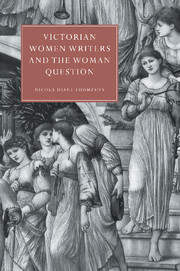Book contents
- Frontmatter
- Contents
- List of illustrations
- Notes on contributors
- 1 Responding to the woman questions: rereading noncanonical Victorian women novelists
- 2 Marriage and the antifeminist woman novelist
- 3 Breaking apart: the early Victorian divorce novel
- 4 Phantasies of matriarchy in Victorian children's literature
- 5 Gendered observations: Harriet Martineau and the woman question
- 6 Maximizing Oliphant: begging the question and the politics of satire
- 7 Literary women of the 1850s and Charlotte Mary Yonge's
- 8 Portraits of the artist as a young woman: representations of the female artist in the New Woman fiction of the 1890s
- 9 Lady in green with novel: the gendered economics of the visual arts and mid-Victorian women's writing
- 10 Ouida and the other New Woman
- 11 Organizing women: New Woman writers, New Woman readers, and suffrage feminism
- 12 Shot out of the canon: Mary Ward and the claims of conflicting feminism
- 13 E. Nesbit and the woman question
- 14 “An ‘old-fashioned’ young woman”: Marie Corelli and the New Woman
- CAMBRIDGE STUDIES IN NINETEENTH-CENTURY LITERATURE AND CULTURE
4 - Phantasies of matriarchy in Victorian children's literature
Published online by Cambridge University Press: 01 March 2010
- Frontmatter
- Contents
- List of illustrations
- Notes on contributors
- 1 Responding to the woman questions: rereading noncanonical Victorian women novelists
- 2 Marriage and the antifeminist woman novelist
- 3 Breaking apart: the early Victorian divorce novel
- 4 Phantasies of matriarchy in Victorian children's literature
- 5 Gendered observations: Harriet Martineau and the woman question
- 6 Maximizing Oliphant: begging the question and the politics of satire
- 7 Literary women of the 1850s and Charlotte Mary Yonge's
- 8 Portraits of the artist as a young woman: representations of the female artist in the New Woman fiction of the 1890s
- 9 Lady in green with novel: the gendered economics of the visual arts and mid-Victorian women's writing
- 10 Ouida and the other New Woman
- 11 Organizing women: New Woman writers, New Woman readers, and suffrage feminism
- 12 Shot out of the canon: Mary Ward and the claims of conflicting feminism
- 13 E. Nesbit and the woman question
- 14 “An ‘old-fashioned’ young woman”: Marie Corelli and the New Woman
- CAMBRIDGE STUDIES IN NINETEENTH-CENTURY LITERATURE AND CULTURE
Summary
Yet women have a mission! aye, even a political mission of immense importance! which they will best fulfil by moving in the sphere assigned them by Providence; not comet-like, wandering in irregular orbits, dazzling indeed by their brilliancy, but terrifying by their eccentric movements and doubtful utility.
This chapter addresses the maternal in noncanonical children's literature by women as a trope that exposes the blind spot of the dominant Victorian gender ideology. Far from entrenching the feminine within the domestic and private, phantasies of the maternal expose motherhood as the vehicle for a transgressive agency which crosses that artificial divide, the separate spheres of activity. Although children's literature is specifically addressed to children and to mothers who read aloud to them, the literature is inherently interwoven with the nineteenth-century debate about the political valency of motherhood and its pervasive influence upon children. This chapter explores a group of noncanonical children's writers – Maria Louisa Molesworth, Julia Horatia Ewing, Frances Browne, and Jean Ingelow – in terms of the representation of the maternal. In particular, I am interested in the tensions produced by the attempted containment of middle-class women within the domestic sphere, which is contingent upon the assertion of female influence upon children and upon patriarchs in the public sphere.
The children's literature written by these authors does not explicitly address the woman question, nor were the authors in any way actively involved in women's enfranchisement. As a result of her religious convictions, Ingelow firmly rejects supporting the women's movement.
- Type
- Chapter
- Information
- Victorian Women Writers and the Woman Question , pp. 60 - 79Publisher: Cambridge University PressPrint publication year: 1999
- 1
- Cited by

